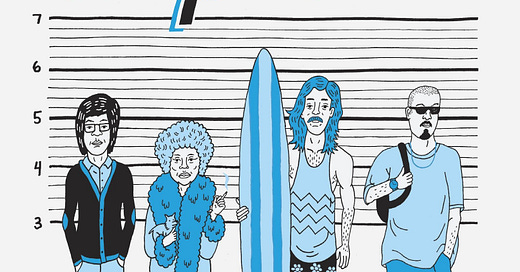Jay Caspian Kang and the Old, Weird Future
The first installment of "The Backlist" and "T-Shirt of the Week"
Here’s a little thing I’ve been thinking about doing for some time now. Every month or so I’m going to read a book from the last 21 years. Why 21? Because the 21 Club closed, of course.
No. I’m kidding. It’s more because I’d like to use fiction as a way to explore how we’ve tried to make sense of the last two decades of war, American decline, mass surveillance, conspiracy theories, weird buzz terms, celebrity culture, social media, gentrification, obsession with Millennials turning into obsession with Gen. Z, Sleater-Kinney continuing on without Janet Weiss (what?), Trump, bad media men, Brooklyn, L.A., Tide Pods and whatever else you can fit into this period of time that has honestly felt like a century in itself. I don’t know exactly how I’m going to go about this, it might be in the form of book reviews, maybe I’ll try and talk to the authors — I don’t know! All I know is that countless great books have come out in the last few years that weren’t written by guys named Jonathan (another topic I’ll probably explore) and maybe did or didn’t get the attention they deserved when they came out, but were good enough in my opinion to still be talked about today. Because that’s this really big, glaring problem I see when talking about literature in America, it’s how we really only talk about a limited number of writers and books beyond what’s new and buzzy or considered “The Classics” or — God help me — the Western Canon. Here is maybe a little opportunity to put the light on some titles that really hold up. I think I might call this “The Backlist.” But we’ll see. It might sound too much like “blacklist” and I don’t want to get into that conversation.
The first book I’m highlighting is Jay Caspian Kang’s 2012 The Dead Do Not Improve. If you have any interest whatsoever in buying this book, maybe consider clicking the link and buying it through Bookshop because I think I set up an affiliate program there and I could use the ten cents it will probably generate for me.
Kang is one of those writers whose work I usually tend to gobble up pretty fast when he has something published, these days usually by The New York Times Magazine. One piece in particular is his 2015 profile on Kareem Abdul-Jabbar that I haven’t shut up about since it was published. More recently, his September, 2020 review of Robert Scoop Jackson’s The Game Is Not a Game: The Power, Protest, and Politics of American Sports was easily one of my favorite pieces of criticism from last year. He recently did a profile on Steven Yeun but I haven’t read it yet. Sorry.
Not everything Kang writes is about basketball, and it’s not all journalism. Obviously from what I wrote at the top, this is about novels, and The Dead Do Not Improve is one I liked very much upon its release nine years ago, and have noticed it creeping into my mind from time to time since. Mainly because its description as a “Loopy, hilarious, neo-noir novel” is really what I’m always looking for more of. I don’t love to quote jacket copy when talking up a book, but that is a particular strain of sub-sub-genre that I’m usually game for. Just like how I find writers and books by Kelly Link or Carmen Maria Machado or Lincoln Michel (who now has his own newsletter that should be worth checking out) interesting because they’re informed by certain genres like horror or fantasy, but they twist it and bend it into something resembling literary fiction. I say “resembling” because I hate that term so much and I don’t want to freak out any potential readers from picking up books by those writers if they haven’t already, but what I mean is that sometimes there’s plot, sometimes there isn’t. Sometimes the stories are scary or weird in a Lovecraft or Jackson way, sometimes they’re like Borges and R. L. Stine in a meat grinder. The point is that they’re great and they tend to deviate very far from whatever we consider contemporary fiction about some family in a gentrified neighborhood being sad or whatever. (Not knocking that sort of stuff, either. I’m a big fan of sad family fiction when it’s done well.)
Kang’s novel resembles detective fiction, but it’s more like Gregory Mcdonald’s Fletch mixed up with Thomas Pynchon’s Inherent Vice. More Robert Altman’s The Long Goodbye rather than the novel it was based off of. There’s a mystery in the book, and there are detectives. There are people thrown into bad situations due to things out of their control, people down on their luck and lots of shady characters who may or may not live on the fringe of society. And, and the risk of sounding like I’m trying to sell you a device that both unclogs your toilet and also helps hang pictures on your wall on some late-night infomercial, there is really so much more. By “more” I mean Kang deals with something I’ve personally always been fascinated by when it comes to Big American Discussions and that is certain groups of people and their place in society. You don’t always pick up a book sold as a neo-noir and expect that sort of thing, but Kang’s characters and their views on not only the Korean American experience, but where that experience fits into the larger American experience, is fascinating to me for a lot of reasons. One big one is that as a first-generation American Jew, I’ve always wrestled with the idea of Jews and whiteness. Yes, many Jews, especially Ashkenazi Jews like myself, are white and benefit greatly from that in a lot of ways. But what you’d consider white culture isn’t ours. We’ve had to work our way into that and adapt it into our own culture and I think it’s been for the worst, to be honest. Kang, who has some Jewish characters in the book like the narrator Philip Kim’s friend Adam who Philip met at Columbia’s graduate creative writing program and who “picked up a variety of drug habits because he thought they would provide a grittier spin on the traditional American Jewish experience. They did not,” shows this experience isn’t just a Jewish one. A particular part in the book that stuck with me is a conversation between the police officer in the book, Sid Finch, and his partner.
“We were talking about Jews, man. Koreans are the new Jews. When white people have to stop feeling guilty about you and start planning around you, it means you’ve arrived,” Sid’s partner says before bringing up a list he’d read of the worst landlords in New York City made up of names like “Shlomo Rubenstein and Jew Jewbergstein” and how the only non-Jewish name was “like Kim Chee fucking Guevara and it’s not only him, number nine is another Korean guy.”
It’s stuff like this that makes me want to keep reading contemporary fiction. I have a better chance of coming close to understanding and feeling some connection to another person’s culture or experience reading this sort of thing instead of another tweet or op-ed. Obviously these are Kang’s characters talking and I’m all about separating the art from the artist in most cases, but “When white people have to stop feeling guilty about you and start planning around you, it means you’ve arrived” line is really excellent. It sums up the American Faustian bargain. And given what we’ve seen in the years since Kang’s novel came out, namely the spike in anti-Jewish and now anti-Asian hate crimes, well, that deal didn’t turn out so good it looks like.
But there’s also another part about the book that struck me as particularly pertinent to our times. I can’t really give too much away because I’d have to break into the plot and possibly give away part of the ending, but let’s just say there’s a weird cult trying to root out people they believe have committed “treasons and perversions against humanity.” Let’s just say the bad guys in this book remind me of a certain cult of idiots who believe that Trump was out to save the children and that there are space lasers controlled by Jews hovering around in outer space. When I went and reread The Dead Do Not Improve, I knew it touched on some themes I feel like have helped define the last 20 years of America, but I didn’t really think of how timely some of those themes and plot points are today, almost a decade after the book’s release.
And yeah, it’s still a “Loopy, hilarious, neo-noir” written by a great writer who knows the ins and outs of the last few decades of pop culture. It’s a fun read, but I could see it presenting a challenge for some readers who, well, don’t want a little challenge in their fiction. The book does move around a little, switching points of view and narration. There are short burst chapters, and like any good book getting tagged “noir,” the dialogue is good and snappy. And, maybe this is just me, but since it’s set in San Francisco, it’s all the weirder to me because — and I mean this with all the respect in the world — San Francisco gives me the creeps now*. Big tech and big money ruined that place and Kang’s book feels set just before that takeover was complete. Like there’s still some of the old, weird San Francisco, but not much.
So that’s it. If this were an actual piece I’d have to send to an editor I’d get a note saying “Where is the fucking ending?” But that is the beauty and the ugliness of doing this on Substack. I can just end this however the hell I want and I’m just going to end it on that thing about San Francisco and tell you to go pick up The Dead Do Not Improve.
*Sorry. Not to sound too down on SF given the fact I live in another city that has had so much of its culture kicked out of it thanks to gentrification, but I do have a past with that city, and I can’t think of anywhere else in America where I feel so out of place now. Have you read Wes Enzinna’s Harper’s article “Gimme Shelter” from a few years ago? It’s been ringing around in my head since I picked up that issue. Plus, everybody I know from there laments what the city has become. I hope it changes, but I’m not sure it will.
T-Shirt of the Week
I also made a joke on Twitter that I’m going to post something about my favorite T-Shirt of the week and, surprise, I wasn’t actually joking. Because, as I’ve learned, the dumbest shit I say on Twitter usually ends up being the worst ideas that I will inevitably convince myself to follow through on. And this week I’m starting it off by saying yes to a long sleeve from The Only Podcast That Matters, Throwing Fits. Friends, the T-shirt of the week this week is the seafood tower shirt. It is glorious.






Looking for this book now, and the Kareem piece. Thank you!